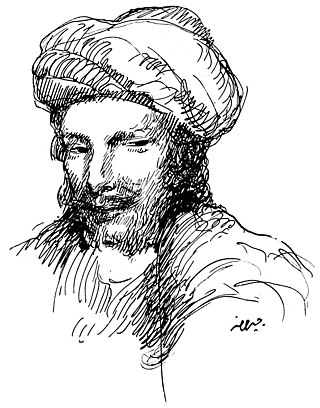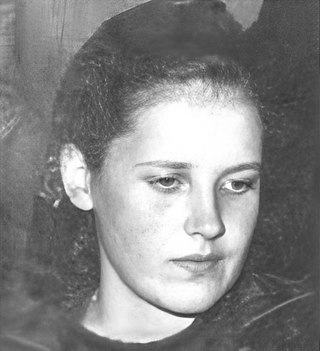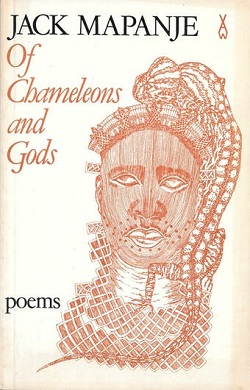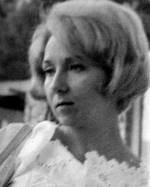Related Research Articles

Abū Nuwās al-Ḥasan ibn Hānī al-Ḥakamī was a classical Arabic poet, and the foremost representative of the modern (muhdath) poetry that developed during the first years of Abbasid Caliphate. He also entered the folkloric tradition, appearing several times in One Thousand and One Nights.
Etheridge Knight was an African-American poet who made his name in 1968 with his debut volume, Poems from Prison. The book recalls in verse his eight-year-long sentence after his arrest for robbery in 1960. By the time he left prison, Knight had prepared a second volume featuring his own writings and works of his fellow inmates. This second book, first published in Italy under the title Voce negre dal carcere, appeared in English in 1970 as Black Voices from Prison. These works established Knight as one of the major poets of the Black Arts Movement, which flourished from the early 1960s through the mid-1970s. With roots in the Civil Rights Movement, Malcolm X and the Nation of Islam, and the Black Power Movement, Etheridge Knight and other American artists within the movement sought to create politically engaged work that explored the African-American cultural and historical experience.
Armando Valladares Perez is a Cuban-American poet, diplomat and former political prisoner for his involvement in the Cuban dissident movement.

Fatima-Zohra Imalayen, known by her pen name Assia Djebar, was an Algerian novelist, translator and filmmaker. Most of her works deal with obstacles faced by women, and she is noted for her feminist stance. She is "frequently associated with women's writing movements, her novels are clearly focused on the creation of a genealogy of Algerian women, and her political stance is virulently anti-patriarchal as much as it is anti-colonial." Djebar is considered to be one of North Africa's pre-eminent and most influential writers. She was elected to the Académie française on 16 June 2005, the first writer from the Maghreb to achieve such recognition. For the entire body of her work she was awarded the 1996 Neustadt International Prize for Literature. She was often named as a contender for the Nobel Prize for Literature.

Nadia Anjuman was a poet from Afghanistan.

Afzal al-Dīn Badīl ibn ʿAlī ibn ʿOthmān, commonly known as Khāqānī, was a major Persian poet and prose-writer. He was born in Transcaucasia in the historical region known as Shirvan, where he served as an ode-writer to the Shirvanshahs. His fame most securely rests upon the qasidas collected in his Divān, and his autobiographical travelogue Tohfat al-ʿErāqayn. He is also notable for his exploration of the genre that later became known as habsiyāt.
Mazisi (Raymond) Kunene was a South African poet best known for his translation of the epic Zulu poem Emperor Shaka the Great. While in exile from South Africa's apartheid regime, Kunene was an active supporter and organiser of the anti-apartheid movement in Europe and Africa. He later taught at the University of California, Los Angeles, and become Africa's and South Africa's first poet laureate.

Algerian literature has been influenced by many cultures, including the ancient Romans, Arabs, French, Spanish, and Berbers. The dominant languages in Algerian literature are French and Arabic.

Shigeji Tsuboi was an influential Japanese poet of the modern era of Japanese literature. He was cofounder of the Dadaist-Anarchist poetry journal Aka tokuro and Bungei Kaiho.
Jack Mapanje is a Malawian writer and poet. He was the head of English at the Chancellor College, the main campus of the University of Malawi before being imprisoned in 1987 for his collection Of Chameleons and Gods, which indirectly criticized the administration of President Hastings Banda. He was released in 1991 and emigrated to the UK, where he worked as a teacher.

Danièle Minne was one of the few European women convicted of assisting the FLN during the Algerian War. Her mother Jacqueline Netter-Minne-Guerroudj and her stepfather Abdelkader Guerroudj, were both condemned to death as accomplices of Fernand Iveton, the only European who was guillotined for his part in the Algerian revolt. Her mother was never executed, partly due to a campaign on her behalf conducted by Simone de Beauvoir; her stepfather was also freed.

Cheikh Zakaria Ben Slimane Ben Yahia Ben Cheikh Slimane Ben Hadj Aïssa, commonly known as Moufdi Zakaria and also referred to by some sources as Zekri Cheikh, was an Algerian activist, nationalist, poet and writer. He wrote the lyrics of Kassaman, the national anthem of Algeria, purportedly with his own blood while imprisoned by the French in 1955.

Of Chameleons and Gods is the title of the first collection of poetry by Malawian poet Jack Mapanje, published in 1981 in the United Kingdom, in Heinemann's African Writers Series. Despite critical acclaim, the collection was withdrawn from circulation in Malawi, because it was seen as a critique of the current government and especially the leader Hastings Kamuzu Banda.
Anna Alexandrovna Barkova, 16 July 1901 – 29 April 1976, was a Soviet Russian poet, journalist, playwright, essayist, memoirist, and writer of fiction. She was imprisoned for more than 20 years in the Gulag.

Gladys May Casely-HayfordaliasAquah Laluah was a Gold Coast-born Sierra Leonean writer. She is credited as the first author to write in the Krio language.
Kristina Masuwa-Morgan is a Zimbabwean poet and short story writer, better known as Kristina Rungano. She was the first published Zimbabwean woman poet.

Mahjoub Sharif, born as Mahjoub Muhammad Sharif Muhammad, was a Sudanese poet, teacher and activist for human rights. He became known in Sudan and other Arabic-speaking countries for his colloquial poetry and his public engagement, both committed to further the causes of democracy, freedom, general well-being and national identity. His poetry was put to music by eminent musicians, such as Mohammed Wardi and Mohamed Mounir, but also led to repeated political imprisonment under different Sudanese governments.

Colette Anna Grégoire was an Algerian poet of French origin. She married an Algerian, considered herself Algerian, and was involved in the struggle for Algeria's independence from France. Her work shows her love of the Aurès Mountains where she grew up, and her strong political beliefs.
Saida Menebhi was a Moroccan poet, high school teacher, and activist with the Marxist revolutionary movement Ila al-Amam. In 1975, she, together with five other members of the movement, was sentenced for seven years of imprisonment for anti-state activity. On November 8, 1977, inside the jail in Casablanca, she participated in a collective hunger strike, and died on the 35th day of the strike at Avicenne Hospital.

Djamel Amrani was an Algerian writer of French expression.
References
- ↑ Gathering Seaweed: African Prison Writing, By Jack Mapanje, Heinemann 2002
- ↑ "Leila Djabli". Poetry Foundation Website. Retrieved December 4, 2016.